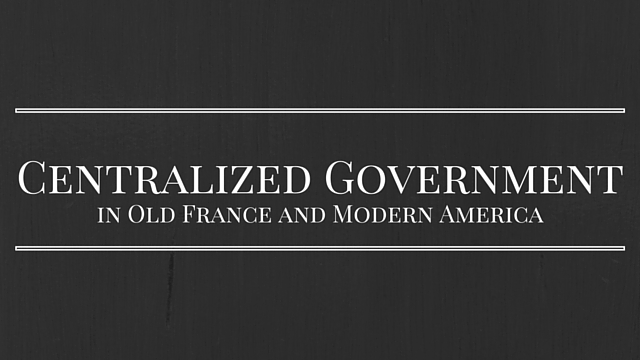Blog
Centralized Government in Old France and Modern America

April 22, 2016
By Dennis Teti
The French author Alexis De Tocqueville’s less well known book is titled The Old Regime and the French Revolution. Tocqueville’s historical narrative analyzes the centralization of power under France’s kings that led up to the Revolution of 1789. But it could just as well describe Washington DC circa 2016.
France once was a decentralized society of great estates and peasants ruled by powerful aristocrats under a weak national monarchy. As feudalism waned, many big estates were broken up and sold, but Paris imposed heavy tax burdens on the middle and lower class owners who could hardly make a living out of them. Over six generations the national government kept growing. It interfered in far-flung localities. A national “Royal Council” was established under a bureaucratic director. The council regulated welfare payments for the poor in isolated villages, dictated how farmers should run their farms, allowed or banned factory construction on the king’s whims, and sent mounted police around the country to enforce its decrees and intimidate the people. The government continuously rewrote trivial laws and regulations so citizens no longer knew what was legal or illegal.
The Royal Council resented the people’s right to free voluntary associations but practiced what we call “crony capitalism” to enrich its corporate favorites. Government was swamped with a flood of paperwork, blank forms, and an “obsession with statistics.” It could take two or three years for a church to get permission to repair its steeple or living quarters. The French people came to believe that large scale enterprise couldn’t succeed without government intervention. Even simple farming, which the peasants had carried on for centuries, was now supposed to require government involvement.
Government “stepped into the place of Divine Providence,” as Tocqueville perfectly described it. Special interest petitions for favors exploded: people who lost homes and cattle wanted public compensation; rich landowners demanded financial aid to improve their estates; businessmen sought monopolies to protect themselves against competitors; business people looked for treasury loans when things didn’t go well for them. More often than not, these petitions were granted. Tocqueville coined the name “paternal government” to describe it. Centralization peaked with the French Revolution. Thousands of noblemen and women, politicians, nuns and priests, hapless street people, and ordinary businessmen were swept up, terrorized, and guillotined. As Tocqueville said, the French Revolution did not oppose paternalism. The Revolution was paternalism’s highest expression.
Old France’s centralization resembles Washington’s today: the same arbitrary and incoherent regulations, the explosion of unaccountable bureaucrats, burdensome taxes on work effort, the ceaseless demands for special favors, the same falsehood that nothing can be built without government help. 90 years ago the federal government was still so small that President Calvin Coolidge said it could go out of business and the people would not know it for months. To hear today’s politicians tell it, Washington has to wire every brain in the nation just to make the people think and move.
There’s a revolution coming to America. Will it be a revolution to complete centralization, or a revolution to reverse it and restore the limits on government? Tocqueville has shown us the dangerous and terrible path down which centralization leads. We must learn this lesson in time to recover America’s freedom.
Dennis Teti was a policy advisor to Congressman/HUD Secretary Jack Kemp, and to Budget Committee Chairman (now Speaker) Paul Ryan, and taught undergrad and grad level Government courses at Hillsdale College and Regent University.

Great article. Now I have to buy the book.